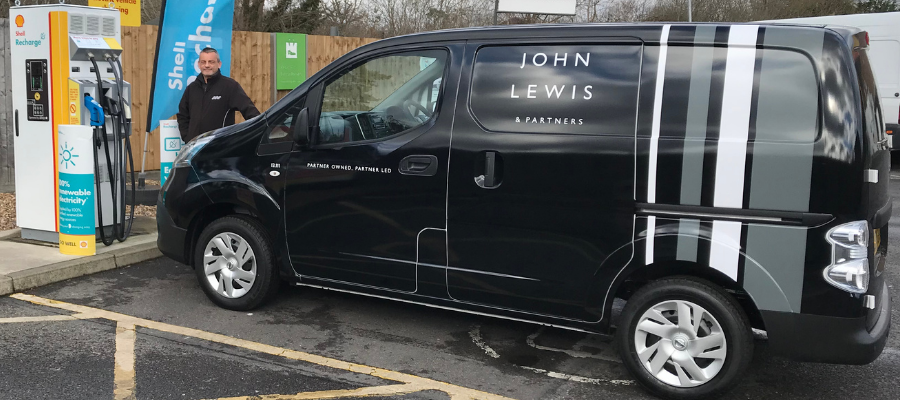🕒 Article read time: 2 minutes
John Lewis Partnership electrifies its entire Home Services fleet

As part of its commitment to transition 4,000 cars, vans and light trucks to electric vehicles (EV) by 2030, the John Lewis Partnership, a longstanding member of Logistics UK, is replacing its entire Home Services fleet with 350 electric vehicles.
The Partnership is being supported by EV technology specialists Flexible Power Systems, (FPS), which is establishing a mixed charging solution incorporating depot, public network and home charging.
The trial will start next month and FPS will integrate data collected into a wider electrification plan for the 350 Home Services vehicles, which provide home estimating and fitting services for John Lewis. The project follows a successful joint wireless van charging trial currently underway at Waitrose at St Katharine Dock in London.
The move follows a commitment by the Partnership to have a fossil free fleet by 2030. The employee-owned department store and supermarket business plans for all its HGVs to be running on biomethane by 2028 and for all its delivery and Home Services fleet to be electrified by 2030. A fossil free fleet will give the John Lewis Partnership an 80% carbon reduction versus diesel, saving an estimated half a million tonnes of CO2.
By 2030, the John Lewis Partnership will have electrified all cars, vans and light trucks, and for sectors where that is not currently possible, such as farm vehicles, HVO biodiesel will be used.
Kate Cosco, Product Services Field Manager, John Lewis Partnership, said: “This is another step along the path of the John Lewis Partnership’s ambition to move completely away from fossils fuels in the fleet by 2030, saving an estimated 500,000 tonnes of CO2 between 2020 and 2030. This is a wonderful opportunity to test how electric vehicles work for us in Home Services. The team is extremely excited to get out on the road and to begin driving these new vehicles.”
Michael Ayres, Managing Director of Flexible Power Systems, said: “Companies like the John Lewis Partnership have to electrify their fleets to combat climate change. Replacing commercial diesel fleets with electric vehicles is just one part of the picture. We need to bring together the ecosystem of chargers, power management and operational interfaces required to keep fleets serving customers efficiently.”
“Like many company car drivers, Home Services partners have a range of working patterns and living arrangements, we need to ensure we can offer a flexible and scalable charging solution to fit these needs via depot, home or public network charging.
“It’s essential to collect data through trials like this one, to inform and de-risk the very substantial decarbonisation investments in vehicles and infrastructure fleets are planning.
“One-size doesn’t fit all in fleet electrification projects. A range of operational, site and vehicle requirements need to be balanced to arrive at effective strategies.”
Michelle Gardner, Head of Public Policy and decarbonisation lead, Logistics UK, said: “It is very encouraging to see how the John Lewis Partnership is embracing the need to decarbonise both the lighter and the heavier end of its commercial fleet.
“The Partnership was one of the first to sign up to our Route to Net Zero campaign, which is designed to help the logistics industry come together to achieve Net Zero as quickly as possible. I urge all members thinking about taking their next steps towards decarbonising their fleets to find out more about our campaign and sign up to the Route to Net Zero pledge.”
*www.logistics.org.uk/environment/netzero
Published On: 24/02/2022 16:00:05

Comments Section
If you are a Logistics UK member login to add comments.